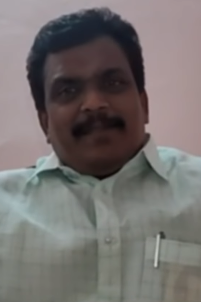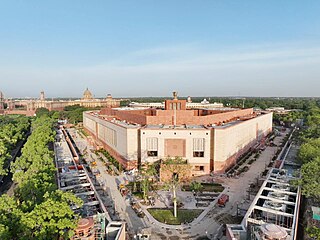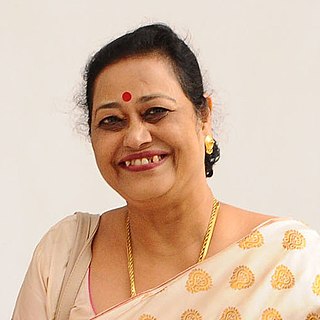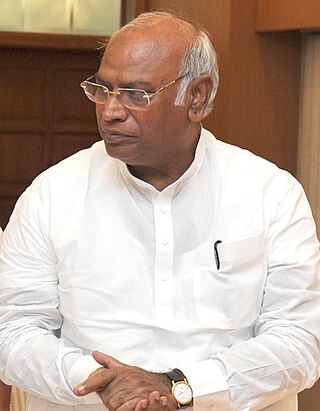Related Research Articles

The Rajya Sabha, also known as the Council of States, is the upper house of the bicameral Parliament of India. As of 2023, it has a maximum membership of 245, of which 233 are elected by the legislatures of the states and union territories using single transferable votes through open ballots, while the president can appoint 12 members for their contributions to art, literature, science, and social service. The total allowed capacity is 250 according to article 80 of the Indian Constitution. The current potential seating capacity of the Rajya Sabha is 245, after the Jammu and Kashmir (Reorganisation) Act. The maximum seats of 250 members can be filled up at the discretion and requirements of the house of Rajya Sabha.

The Lok Sabha, also known as the House of the People, is the lower house of India's bicameral Parliament, with the upper house being the Rajya Sabha. Members of the Lok Sabha are elected by an adult universal suffrage and a first-past-the-post system to represent their respective constituencies, and they hold their seats for five years or until the body is dissolved by the President on the advice of the council of ministers. The house meets in the Lok Sabha Chambers of the Parliament House, New Delhi.

The Parliament of India or Indian Parliament, is the supreme legislative body of the Republic of India. It is a bicameral legislature composed of the Rajya Sabha and the Lok Sabha. The President of India, in their role as head of the legislature, has full powers to summon and prorogue either house of Parliament or to dissolve the Lok Sabha, but they can exercise these powers only upon the advice of the Prime Minister and their Union Council of Ministers.

The vice president of India is the deputy to the head of state of the Republic of India, i.e. the president of India. The office of vice president is the second-highest constitutional office after the president and ranks second in the order of precedence and first in the line of succession to the presidency. The vice president is also the ex officio chairman of the Rajya Sabha.

Thanga Tamil Selvan is an Indian politician. He is a member of the Tamil Nadu Legislative Assembly from Andipatti constituency. Previously, he was a member of Parliament of India representing Tamil Nadu in the Rajya Sabha, the upper house of the Indian Parliament and Member of the Tamil Nadu Legislative Assembly from Andipatti constituency in 2001-2002 period.
Lok Sabha TV was an Indian public cable television network channel that offered coverage of central government proceedings and other public affairs programming. Its remit was to make accessible to all the work of the parliamentary and legislative bodies of India. The channel broadcast live and recorded coverage of the Lok Sabha while Rajya Sabha TV covered the sessions of the Rajya Sabha.

The Deputy Chairman of the Rajya Sabha presides over the proceedings of the Rajya Sabha in the absence of the chairperson of the Rajya Sabha. The deputy chairperson is elected internally by the Rajya Sabha.
Rajya Sabha TV was an Indian public cable television network channel owned and operated by Rajya Sabha that covered the proceedings of Rajya Sabha. It has now been replaced by Sansad TV. Apart from telecasting live coverage of Rajya Sabha proceedings, RSTV also brought detailed analyses of parliamentary affairs. While focused on current national and international affairs, it provided a platform for knowledge-based programmes for the discerning viewer. The channel offered special attention to legislative business undertaken by the Parliament.

A Member of Parliament in the Rajya Sabha is the representative of the Indian states to one of the two houses of the Parliament of India. Rajya Sabha MPs are elected by the electoral college of the elected members of the State Assembly with a system of proportional representation by a single transferable vote. The Parliament of India is bicameral with two houses; Rajya Sabha and the Lok Sabha. Compared to the Lok Sabha, the Rajya Sabha has fewer members and its members have more restricted power. Unlike the Lok Sabha, the Rajya Sabha is a permanent body and cannot be dissolved at any time. However every second year, one third of the members are retired and the vacancies are filled by fresh elections and Presidential nomination at the beginning of every third year.

Member of Parliament (MP) in India refers to persons who serve in the Parliament of India. These include:

Joyasree Goswami Mahanta is an Indian politician. She was a Member of Parliament, representing Assam in the Rajya Sabha the upper house of India's Parliament as a member of the Asom Gana Parishad. She is an Assamese language writer and educationalist. She was awarded India's fourth highest civilian award the Padma Shri in 2018.
Babubhai Maneklal Chinai (1913-1975) was an Indian politician. He was a Member of Parliament representing Maharashtra in the Rajya Sabha the upper house of India's Parliament. He was awarded India's third highest civilian honour the Padma Bhushan in 1966.

The Amma Makkal Munnetra Kazhagam is an Indian regional political party in the state of Tamil Nadu. It is founded by the former member of parliament T. T. V. Dhinakaran at Melur on 15 March 2018 as a breakaway faction from the All India Anna Dravida Munnetra Kazhagam after his expulsion him from party. The headquarters of the party is located at Westcott Salai, Royapettah, Chennai.

The Leader of the Opposition in Rajya Sabha is an elected Member of Parliament, Rajya Sabha who leads the official opposition in the Upper House of the Parliament of India. The Leader of the Opposition in the Rajya Sabha is the parliamentary chairperson of the largest political party in the Rajya Sabha that is not in government.

The Leader of the Opposition in Lok Sabha is an elected Member of Lok Sabha who leads the official opposition in the Lower House of the Parliament of India. The Leader of the Opposition is the parliamentary chairperson of the largest political party in the Lok Sabha that is not in government. Rahul Gandhi is currently serving as Leader of the Opposition in the Lok Sabha.
The Secretary General of the Rajya Sabha is the administrative head of the Rajya Sabha Secretariat. The secretary general is appointed by the Chairman of Rajya Sabha. In Indian order of precedence, the post of secretary general is of the rank of Cabinet Secretary, who is the senior most bureaucrat in the Government of India.
References
- ↑ "Dhinakaran re-elected as AMMK's general secretary". DT Next. 6 August 2023. Retrieved 20 July 2024.